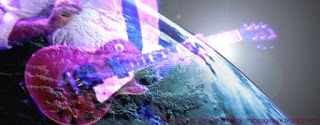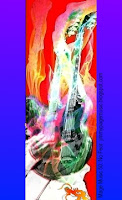~ Terry Pratchett, Snuff (Discworld)
Mage Music 52
I confess that part of the reason I wanted to write was because I couldn't seem to find anything about what I wanted to learn anywhere else. There is so much to say about Jimmy Page's work, but I wasn't finding anyone writing about what I was interested in reading about, which wasn't the drugs, sex or excesses, the outfits, his facial expressions or his hair (sorry if that offends or disappoints, but there it is).
And of course, people like to natter on about Mr. Page's connection with the occult, specifically the work of Aleister Crowley. To me that wasn't the right direction. Yes, there was Magick in the music but it was so obviously Jimmy Page's own Magick - not someone else's - that I didn't see the point of looking to anyone or anywhere else for answers.
So I have spent a year exploring the concepts, delving into understanding the basis of Magick across disciplines and focusing on music as an expression of Magick. I used Mr. Page's work as inspiration for the words I wrote. I came to understand that I was translating from not only another language but another reality, and the result could only ever approximate the depth, the beauty and the mystery of what I sought. Still, the music compelled me to keep trying. Or maybe it's been the Magick doing so.
It took me somewhere and made me grow
Over the course of the year I listened to so much of Jimmy Page's music that I began to hear it in an entirely different way. The beauty and mystery that had always called to me now was speaking to me with a meaning that I could almost comprehend, but that remained elusive. I knew I would understand if only I listened just a little more closely, a little more carefully, so I really listened, focusing on what I was hearing at the root rather than at the surface.
What I was hearing was the Magick that was speaking through Mr. Page's guitar, of course. I came to understand that I was never going to understand it with my thinking brain, because Magick is meant for a deeper part of a human than that.
I'm no musician, I'm a listener and I'm a writer, so I finally just let the mystery of the music flow past my brain and into my heart and soul to inspire me and push my own creative process. I found myself writing much more than I ever had before, and about things that that I didn't know I knew. The music of Jimmy Page has taken me to times and places I'd never been before in my own work - a process so exciting and so inspiring that I plan to keep going there.
♫
The job of the artist is to recognize the truth of All That Is and to fairly represent it to the best of his ability. The tragedy of the artist's lot is knowing that, no matter how skilled he is, the artist's creation can only ever be an infinitesimal aspect of All That Is. And the triumph of the artist is that he keeps doing it anyway.
Here is a Kashmir playlist - because the Magick is right there.
♫
I hope you have enjoyed reading these posts as much as I've enjoyed writing them this past year. I hope you won't mind if I keep on writing them, too. I've got another big project in the works that I'll be talking about in upcoming months, but you can count on Mage Music posts every week as long as the music has Magick. I guess that'll be for a while.
 |
| As always, thank you Jimmy Page |








 was published.
was published.